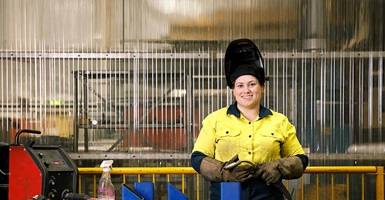As Co-ordinator of In-home Support at the City of Greater Dandenong, Sally Goedheer keeps busy organising support for a diverse and growing local population.
"We've got 125 community care workers who provide in-home support to help people maintain their independence – and they service approximately 2500 clients across the municipality,” she says.
To bring on more trained staff to meet demand within the area, the council partnered with Chisholm to deliver a traineeship program, taking on 20 support worker trainees.
Sally says the program’s been a “wonderful” experience and has resulted in a cohort of newly qualified and enthusiastic workers now employed by council.
Traineeships are suited to a wide range of industries – everything from support work to recreation to dental assistance to business and IT. If you’re considering a trainee program for your organisation, here’s what to keep in mind.
How does a traineeship work?
Traineeships enable participants to undertake paid work with an employer while they study and work towards a qualification.
Programs can run for one or two years, and trainees can be employed on a full-time or part-time basis.
Traineeships work for a wide range of professions but are generally for non-trade roles, whereas apprenticeships cover trade roles.
The City of Greater Dandenong’s trainees studied part time at Chisholm while working part time with council over a 12-month period.
Sally says the trainees had the option to work 15, 20 or 25 hours a week, to suit their personal circumstances.
“Some people had families or other things going on, so 15 hours was enough for them; others didn't have those additional responsibilities but perhaps needed the extra income,” she says.
In the learning component of the program at Chisholm, trainees completed online and face-to-face modules and received guidance from the institute’s expert trainers.
To help put their learning into practice on the job, trainees were each assigned a council worker as a mentor – which Sally says worked really well.
“This was a huge advantage, having the mentors to support the trainees on the job – it helped to consolidate and strengthen their learning,” she says.
What are the benefits of a traineeship for employers?
With 20 years of experience delivering traineeships programs, Chisholm Institute is a trusted partner for organisations like the City of Greater Dandenong.
Sally says the program was “a partnership in the truest sense of the word” and provided a range of benefits for the council.
Contemporary skills training
By taking on trainees who were completing their qualification at Chisholm, Sally says council could be confident they were working with people who were gaining “contemporary, progressive” skills and knowledge.
“The units that they were studying at Chisholm really aligned with the service types that we're offering,” she says.
Instil organisational values
Sally says the 12-month program length enabled council to impart their organisational values to the trainees, alongside the practical skills.
Meeting with trainees each week meant that Sally’s team could instil those values from the beginning.
“Having the ability to drip feed and embed our council’s values has really resulted in a cohort of newly qualified care workers who really demonstrate all of those values within service provision,” she says.
Diverse candidates
The program gave council access to diverse employees, which is advantageous in a culturally and linguistically diverse area like Dandenong.
“Because we work in such a diverse community, we’re actively recruiting for language,” says Sally.
The trainees who took part in the program with Chisholm came from diverse cultural backgrounds and brought with them valuable language skills and cultural understanding.
Solution to your staffing issues
Traineeships can start anytime – you don’t have to wait for course start dates – giving you access to more staff to help meet shortages.
Wage subsidies
As an employer taking on a trainee, you may be eligible for a wage subsidy provided by the federal government.
How do trainees benefit?
A big positive for many trainees is the ability to earn an income while completing their nationally recognised qualifications.
“We found the ‘earn and learn’ model was really encouraging for people who may not have been able to study previously for financial reasons – it gave them a bit of an incentive,” says Sally.
She adds that on-the-job training and support helps trainees build confidence in their new skills in a real-world setting.
“Allowing trainees to put into practice what they are learning in theory is also very important, because a simulated environment like lab work doesn't always hit the mark as much as when you’re working face to face and actually dealing with people.”
While there’s no minimum number of trainees an organisation needs to take on, for Sally’s cohort, the group support proved valuable.
“For the trainees, having colleagues who they could go through it with together was great,” she says.
“There's been a real camaraderie between them, because they did it as a group.”
What support do employers receive from Chisholm?
As an employer, you’ll work with a dedicated liaison at Chisholm, to help the traineeship program run smoothly.
Chisholm also provides training to the existing staff at your organisation who choose to become mentors, to ensure they are equipped to help trainees.
Sally says these training workshops provide valuable leadership skills to existing staff and are “customisable” to ensure they are genuinely beneficial for your organisation.
This training is tailored to your industry and business, whether you’re in IT, Business, recreation, childcare, hospitality or another area.
What are the outcomes of traineeship programs?
Of the group of 20 who signed up to the program, the City of Greater Dandenong has now employed 18 participants, which Sally describes as “a fantastic outcome”.
“Everyone who's been involved has been really engaged throughout the process,” she adds.
Sally’s advice to other employers considering the traineeship approach?
“Absolutely go for it. The benefits can't be underestimated,” she says.
“To be able to employ people and have someone presenting the theory and providing support in the background – it's just a win–win situation.”


